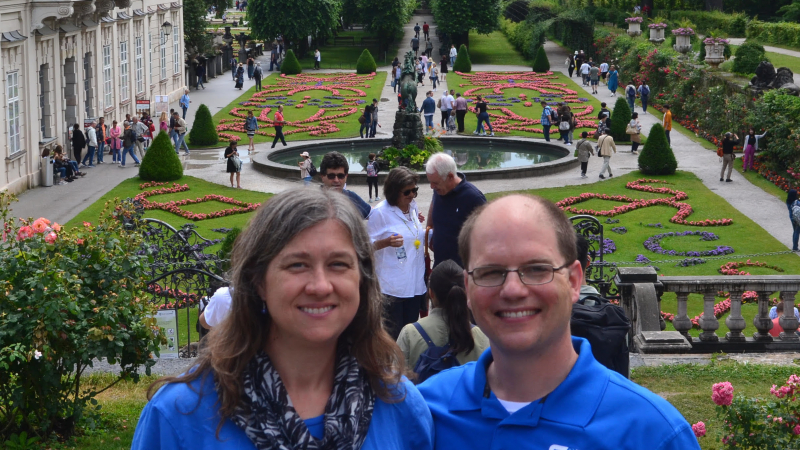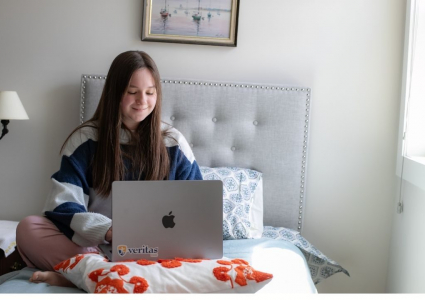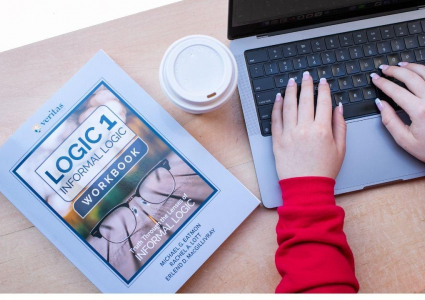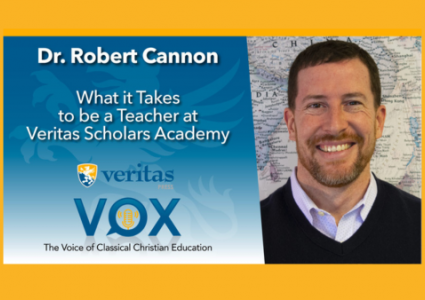The Cumings Family: Our Veritas Story

One modern challenge of homeschooling is choosing which of the many curricula to use. My husband was convinced that a wrong choice would automatically doom our children. If we chose Curriculum A, it might begin well but devolve into a life of academic stupor and end with their mindlessly adopting the constantly vacillating current ideals. But what if the choice of Curriculum B led down a worse path of intellectual snobbery resulting in a system of works righteousness and insufferable pride? I looked at our precious child and wondered how we could adequately challenge her without risking burnout. I wondered which methods were the most successful and whether they would be adaptable to hypothetical future children. Of course they would be brilliant too, but they would be different. I didn’t want to pick a new curriculum for each child or change curriculum every year. The decision seemed immense. Where was the perfect program that would cater to every possible learning style, encourage every gift, and meet every challenge? Looking back I can see how naive and melodramatic we were, but our fears were rooted in very real concerns. How can we protect our children from false teaching while also arming them with the truth, compassion, creativity, and mental strength to engage a broken and desperately needy world? How do we insulate them from the harsh realities of the world but also equip them for “the real world” all without making them cynical and superior?
Because of our concern, but without recognizing its root causes, my husband and I attended our first homeschool convention when our oldest was four, possibly three. We attended some workshops and visited booths, examining curricula and interrogating the vendors about their methods. We came back with an enormous bag of samples, catalogs, and a notebook with pages of hasty, indecipherable notes, and were even more overwhelmed with indecision than before. I called my sister whose son is close in age to our oldest, and droned on and on about the pros and cons of various curricula ending with, “I don’t know how we will ever choose! What are you thinking?” “We are going to use Veritas,” she said with decision. She went on to summarize the classical stages and recommended we read Douglas Wilson’s Recovering the Lost Tools of Learning. After reading it and looking at the Veritas catalog, we were sold. We realized that having a philosophy to shape our choices was very different from cherry picking methods that catered to our tastes or supposed learning styles.
Although Veritas has a well-defined and thorough scope and sequence, there is still freedom to meet the needs of the individual child. We don’t change our curriculum or methods from one child to another, but we do adjust our speed, add review days, or skip supplementary projects as needed. The modifications we need to make are minimal and they all serve the broader classical philosophy. It is a relief to have found an education philosophy that doesn’t just fill, but also shapes the minds of our children.
The early years with Veritas are overall pure delight - though we had/have our share of tear filled episodes over the speed of math fact drills or re-copying a sloppy penmanship page. We love the catchy memory songs and we were blown away with our children’s ability to pull facts out and make connections after just a couple of weeks. They quickly begin to recognize historical references in sermons and (hilariously) classify their piano teachers’ commands effortlessly. “She told me to sit on the mat! That’s a prepositional phrase!” I love the way their eyes light up when they make a real world connection as if we’ve given them a set of keys into understanding adult communication – at least on a surface level. We were also thrilled at the thorough integration of the curriculum. While teaching phonics and reading, the Phonics Museum also introduced our children to great art, music, and historical events. The Wright Brothers Phonics reader was a highlight with our youngest, especially because he had heard his older sister learning about them and was pleased that he got a book about them too. Many of the Phonics Readers are like that: communicating valuable truth, covering historical events, or connecting them to great art and music. They never seem trivial or vapid.
As much as we love the early years, we began to appreciate them more as we got into junior high and high school and realized more fully the value of the foundation we had laid in those elementary years. Our oldest daughter had seemingly endless facts stored up and ready to deploy as she eased into the dialectic stage. As we worked through the literature transition books together I was overwhelmed with their amazing complementarity. The themes and styles compared and contrasted perfectly and she had the literary background that had prepared her to wrestle with ideas in a way I had not attempted until I was in college. The grammar school years had not been mere busy work, entertainment, or marking time.
I love the high school years even more than I had anticipated as we watch our daughter grow into her own convictions more and more. The early years and historical grounding give her a strong framework from which to build. She has an amazing ability to place current thought and events within the broader historical context. This is not just motherly bias; I hear the same level of awareness from her classmates. One of the great joys of this stage are the lively and thoughtful conversations around our table especially when we have extended family or guests. Another joy is listening in on live class debates and discussions as the students learn to logically and respectfully disagree with one another.
Though our three children are spread out from second to tenth grade, I love the amount of overlap they have, as I mentioned above. They enjoy talking together at their varying depths about historical events, musical periods, artistic styles, big ideas, and favorite authors in common. On some level, they each have grasped the goals of our educational model and they embrace them. As Veritas has shaped our educational philosophy over the years, it has also shaped our family culture.
Learn more about how your student(s) can benefit from Veritas Press You Teach curriculum, Self-Paced or Live Online classes or our Diploma Program by contacting our service team today!






